A toddler battles for right to life; a filmmaker calls out I&B Ministry; a young lawyer fights Aadhaar; a Kamathipura girl makes a case for education and a Muslim rapper says oppression means he must sing louder. Meet India's new freedom fighters
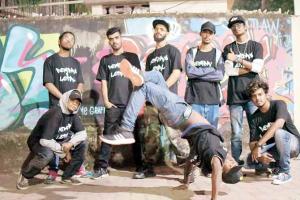
Shaikh (standing, third from left) with other members of Bombay Lokal. Pic/Sameer Markande
'Equality should not depend on man-made divisions'
RIGHT TO EQUALITY >> Aamir Shaikh, 30, of Bombay Lokal, a collective of rappers from Nalasopara, says that if religion is man-made, how can your lot in life depend on it?
ADVERTISEMENT
I moved to Nalasopara from Bihar in 2008, as my father got a better job here, and formed Bombay Lokal in 2016. My father is a civil engineer and my mother, a housewife. The eldest of three children, I gave up my day job as a content writer for a digital firm to pursue music full time, as I felt it's the only way my life makes sense to me. The collective was based on the model that the African Americans adopted in the 1970s to fight oppression. They started rapping, and used hip hop to address social causes. Ever since, hip hop has changed many lives.
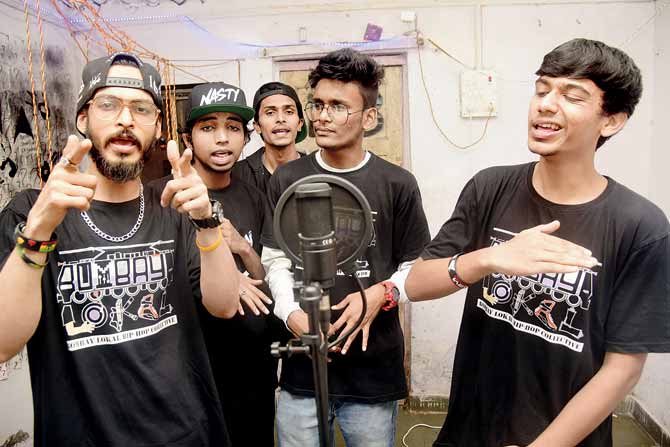
Aamir shaikh Singer with Bombay Lokal
In our collective, too, we have members from different castes and religions - I am Muslim, and there are Dalits, and Hindus and Christians- all of whom have a story to tell. Ever since the current government came into power, so much has happened that we want to talk about - lynchings, killings of minority activists, etc - and I would put up these issues on social media, and get attacked for my views. People would abuse me, call me anti-national and ask me to go to Pakistan - I realised it was futile trying to debate with them. I decided to do what my inspiration, Tupac, the iconic African-American rapper and poet, used to do - he wrote about the atrocities committed against him just because of the colour of his skin. For me, I was facing discrimination as I belonged to a certain religion. We were fighting for our right to be equal to everyone else.
So, I wrote a song called Inquilab Zindabad in 2016 which was mainly speaking against hate-mongering politicians. I realised we, as the collective, are the voice of the people, and we should talk about it through our art.
Many people trolled us for that song - they said I look like a terrorist, but the aim was to put into words what we felt about how we were being treated. I need the freedom to equality to exist, only because I feel all divisions in life are usually mad-made - religion, caste or class. How can my lot in life depend on something that was not decided by nature, but man himself? We are all equal and should be treated that way. But then, people will talk about reservations. And I feel they are important, as the ones who are getting the benefits of reservation see it as a "chance" to get themselves out there in terms of getting good jobs, or higher education.
Reservation is the chance society or government gives minorities to "be equal". You need to understand the need for them before you reject them.
As told to Aastha Atray Banan
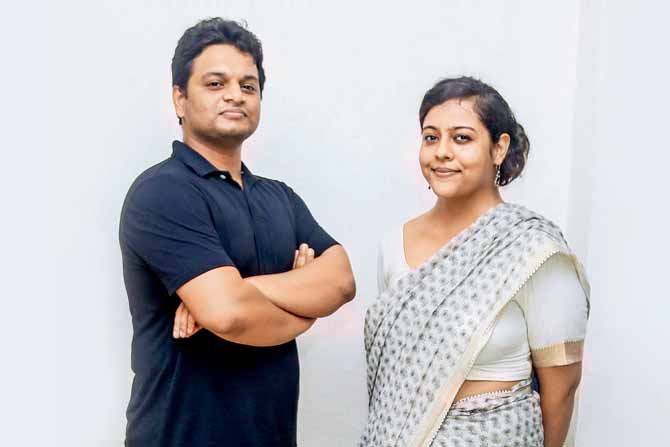
Rohith Jyotish and Praavita, two of the co-founders of Rethink Aadhar. Pic/Nishad Alam
'Being asked to give up biometrics is coercive'
Right to Privacy >> Praavita, 28, one of the 10 co-founders of Delhi-based organisation Rethink Aadhar, on the need to protect the country from becoming a surveillance state
The idea behind Rethink Aadhaar began with discussions between a younger generation of activists, lawyers, researchers and journalists, who had been following the Aadhaar project from its very beginning; it was to bring together those working on issues of both welfare and privacy.
After studying Human Rights at Paris's Sciences Po, I returned to Delhi and began working with the Mazdoor Kisan Shakti Sangathan (MKSS) founded by activists Aruna Roy and Nikhil Dey who were also petitioners in the case challenging Aadhaar at the Supreme Court. It was while researching, writing and working with the MKSS, that I became interested in the case against Aadhaar.
In 2015-16, there was no law-backing project, but it was being treated as mandatory for ration cards and even school admissions. At that time, I met many women in the bastis of Delhi who said that they needed Aadhaar for their children's school admissions, for rations and who had to stand in line for hours, losing daily wages. We were getting reports from across the country that Aadhaar was being made mandatory.
We started meeting as "Rethink" Aadhaar. Our initial conversations revealed that there was a diversity of opinion on Aadhaar. Some thought that the project could be salvaged and some felt it needed to be scrapped outright.
One important moment was that in 2015, the Supreme Court had said that the government was allowed to use Aadhaar only in five programmes — and that it had to widely advertise that enrolment was not mandatory — in 2016, the government passed the Aadhaar Act as a money bill. This was a subversion of democracy, shook many people.
I took down the minutes of the first large meeting in 2016, and then, we worked on the agenda for the next. Soon, it started snowballing into something bigger. We decided to have a website to gather resources and people contributed everything from money to skills and time.
Meanwhile, Aadhaar began to rapidly expand. Aside from the problems that many people faced in giving up biometrics, the question of surveillance was always an overarching problem. Several apps by private companies began to proliferate, which advertised verifying people through the Aadhaar number. Questions arose as to who had our private information, where was Aadhaar data stored, who had access to it and who owned it? When the government announced that Aadhaar would be mandatorily linked to the Pan Card, it felt like everybody woke up. Questions about the citizen's right to privacy entered mainstream discussion and debate. The Supreme Court recognised privacy to be a fundamental right last August.
Rethink Aadhar helped disseminate information straight from the court, so that people can make up their own minds about the project. Social media also became modes of communication, where court hearings were summarised and put out in simple terms.
Aadhaar is coercive, you are being asked to give up your biometrics. I don't have a choice. In June 2016, we coordinated a day of action across the country to protest Aadhaar. There have been workshops and more are expected, unless the project is struck down. The SC's ruling recognising privacy as a fundamental right was a recognition that we have to fight for our rights. The ruling was born out of the consistent fight against the Aadhaar/UID project and the work of many people where we played a very tiny part.
As told to Gitanjali Chandrasekharan
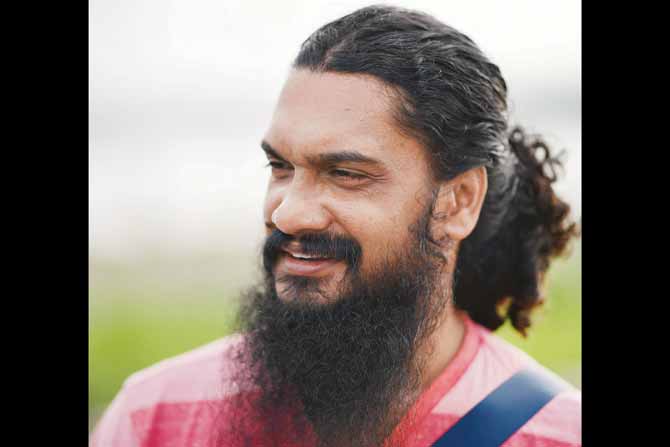
'If filmmakers fight, who will make films?'
RIGHT TO EXPRESSION >> Sanal Kumar Sasidharan, 41, had to approach the courts after his film S Durga, initially Sexy Durga, was denied screening at IFFI after a directive by the I&B Ministry
I was trying to make a film on the contradictory ideas that society harbours - on the one hand it makes women into goddesses, and on the other it questions her character if she is seen outside her home in the evenings or late at night. That is what I was trying to say through S Durga - one side is Durga, another, sexy. The film, which released in theatres in India on March 23, 2018, is about a couple that is eloping and all the hardships they face in their journey, it's a dark road movie of sorts. Religion and god play no role in it. But politicians did not want to see it that way. They wanted to tarnish my film as anti-Hindu.
When I had first announced the title of my film, Sexy Durga, on Facebook, I got a barrage of hate mails and hate comments. There were anonymous callers threatening me with dire consequences, they would say, "we won't allow you to leave the city", "we will harm your wife" and so on. They even suggested that I title my film Sexy Fatima or Sexy Maria but not Sexy Durga. This is where the problem lies. These people don't want to address the issue at the core, but create more problems out of it. When the harassment got a bit much, I filed a police complaint. I was not scared of those who threatened me. I strongly believe that fear is our greatest enemy.
Whatever has to happen will happen. But, if you believe in something, you cannot allow someone else to walk over you. The film was doing well at international film festivals. When I got the Hivor Tiger Award at the International Film Festival of Rotterdam in February, 2017, that is when the threats intensified. But, I stood firm on my ground.
When I submitted the film to the censor board in August 2017, almost all of them had a problem with the title. The only way forward for me was to trim it to 'S' Durga instead of Sexy Durga. But, once a title is established, it stays. Since everyone knew the film as Sexy Durga, whenever they saw 'S', they knew what it stood for. It was a pointless exercise.
What happened at IFFI, Goa, was something I was expecting. I knew the film would not make the final selection, as all festival screenings need the approval of the I&B Ministry. The jury, however, had put my film on the list and it was removed by the Ministry at the last minute. That is when I decided to fight it. The fight was not for my film. It had got enough eye balls and recognition. My fight was against the government thwarting my freedom of expression. I filed a writ petition at the Kerala High Court which the judge ruled in my favour. The opposition appealed, and the appeal too swung in my favour.
Despite this, the film did not end up being screened at IFFI due to other complications. But, I was sure I would not give up without a fight. I still believe my film is not wrong. But, if our society is narrow-minded, then the government makes it even more so. The government wants to create masses and not individuals, and therefore they will propagate one slogan.
It is not realistic for filmmakers to get into a battle. If they keep fighting, who will make films? But one should not be scared. You cannot be your own censor board.
As told to Kusumita Das
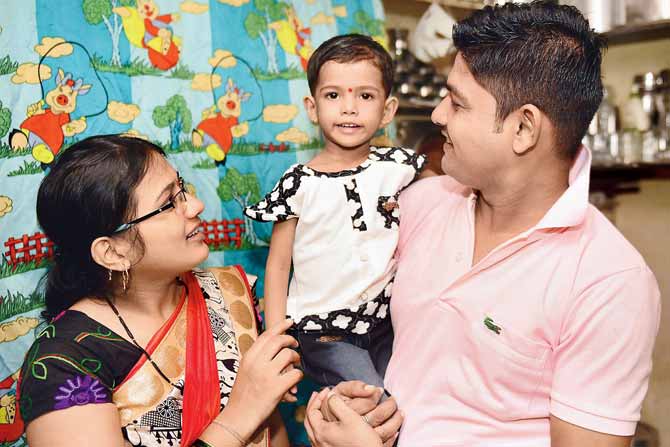
'What's not in our hands is Mumbai's pollution'
RIGHT TO LIFE >> Worli resident Ravi Patil on the struggle faced by their three-year-old daughter Saisha Patil, who is battling asthma and the city's poor air quality
IT was eight months after our daughter was born that the trouble started. She had been healthy, but took ill suddenly. She had a cold and a fever for a couple of days, when one night, there was a sound from her chest. It went like dharr-dharr. She seemed to be either holding her breath or breathing too fast. Worried, we rushed her to Bai Jerbai Wadia Hospital in Parel, where doctors concluded that she had bal asthma [childhood asthma, as it’s called in Marathi].
Saisha is three now. Ever since she was diagnosed with asthma, we have done our best to make her feel comfortable. We don’t open the windows, or wear perfumes at our home in Worli Naka. We don’t even light a mosquito coil, for any of these substances could trigger a wheezing attack. For that matter, we don’t even let her eat chocolate cake, for chocolate causes her to wheeze as well.
While we have been able to control the home environment, what’s not in our hands is the world outside and Mumbai’s pollution. What’s worse, is that doctors have told us that it is highly likely that Saisha’s condition has been caused because of air pollution. Because of this, we don’t let her play at our neighbours’ or in the playgrounds with other children because she is susceptible to contracting air-borne diseases. When we want to take her around town, it helps that I have a Cool Cab business. My air-
conditioned car is the only way that we can travel when Saisha is with us, else it is too risky for her to
be exposed to Mumbai’s pollution levels.
Bal asthma is not easy to cure but can be controlled with nebulizers and medication. However, we have still had to hospitalise Saisha quite often. In the last three years, we have admitted her about 10 times. It happens mainly when the weather changes, which brings on a fever and then asthma. We still don’t know why, though. I spend nearly Rs 25,000 every time she is hospitalised, even though her medicines and nebulizers don’t cost as much.
Over the last three years, we have conducted numerous tests, right from blood tests to CT scans. Some of these tests are expensive, and done at labs in Bengaluru, but they all show that our daughter Saisha is fine. There is nothing wrong her with physiologically. So, we sought another opinion from a doctor in my hometown, Kodoli [in Kolhapur district]. The doctor was of the opinion that we should see how Saisha fares in Kodoli, away from Mumbai’s pollution. There seemed to be a difference, but for how long could we keep her there?
My wife and I are still not sure how we will get her to playschool and later to nursery. We are not sure at this point if she will be able to cope with Mumbai’s air pollution.
As told to Benita Fernando

'Classmates would say r**** ki beti'
RIGHT TO EDUCATION >> Sandhya Nair, 22, daughter of a sex worker on what it took to move from Kamapthipura to New York's premier university
It's been a year since I moved to New York for my undergrad course at Wagner University in Staten Island. The sprawling campus is a far cry from the 19 years I spent at Kamathipura. M mother was a sex worker, but left the profession when I was four years old. But we could never move out of the area as rents were exorbitant.
For me, problems began when it was time to go to school. No private school would admit me. The fact that I was the daughter of a former sex worker and lived in a red light district closed all doors. Finally, we were forced to tweak our address to Khetwadi instead of Kamathipura, and that's when I finally got admission. But, my school teachers and peers soon found out, and I was often ridiculed for being the daughter of a prostitute. They would make me sit on a broken bench in a corner. Classmates would taunt me saying, 'R**** ki beti hai, tujhe padh ke kya karna hai?'.
When I was 10 years old, I was sexually abused. I responded by withdrawing into my shell. I just scraped through Std X. By then, my mother decided to move back to Kerala. I applied for good colleges in the state, but couldn't get admission because of the unreal cut offs. An average student has to settle for an average life, so I took what I got.
The true test of an esteemed educational institute is when it can admit an average or below average student and still maintain their standard of education. This monolith education system which doesn't accommodate the no-so-exceptional learners is killing dreams of a lot of students.
Reports of Shweta Katti becoming the first girl from an Indian red light area to study abroad were my turning point. According to reports, Robin Chourasia, the founder of Kranti, an NGO based in Mumbai, which works for the upliftment of sex workers and their daughters, had changed Shweta's life. I messaged Shweta on Facebook and she connected me with Robin, who asked me to catch the next train and come to Mumbai. My mother, however, was against the idea. She wasn't going to let me go back to the city. She wanted me to finish my 12th standard exam and get married, but I wanted to study, go abroad for higher education, salvage my past. It took me a year to convince her.
At Kranti, I spoke to the counsellor about the abuse during therapy. After that, I started thawing. The curriculum included topics such as class, religion, the environment, gender, sexuality and women's rights. As I learnt more, I grew more accepting of myself, it improved my relationship with my mother. I wanted to learn and grow. It was this thirst for knowledge that led the organisation to select me to go abroad to study.
Today, I am one of the six girls from the organisation who are studying abroad. I'm back in Mumbai for a few weeks for my summer break. I want to study pyschology and not anthropology at the university, but the fees is turning out to be a problem, because at the time I was sent thanks to a few generous donations to the organisation. But I'm not giving up.
The Right to Education is a basic human right, but granting it is not enough. I need to have the right to receive quality education irrespective of my background.
As told to Anju Maskeri
Catch up on all the latest Mumbai news, crime news, current affairs, and also a complete guide on Mumbai from food to things to do and events across the city here. Also download the new mid-day Android and iOS apps to get latest updates
 Subscribe today by clicking the link and stay updated with the latest news!" Click here!
Subscribe today by clicking the link and stay updated with the latest news!" Click here!







